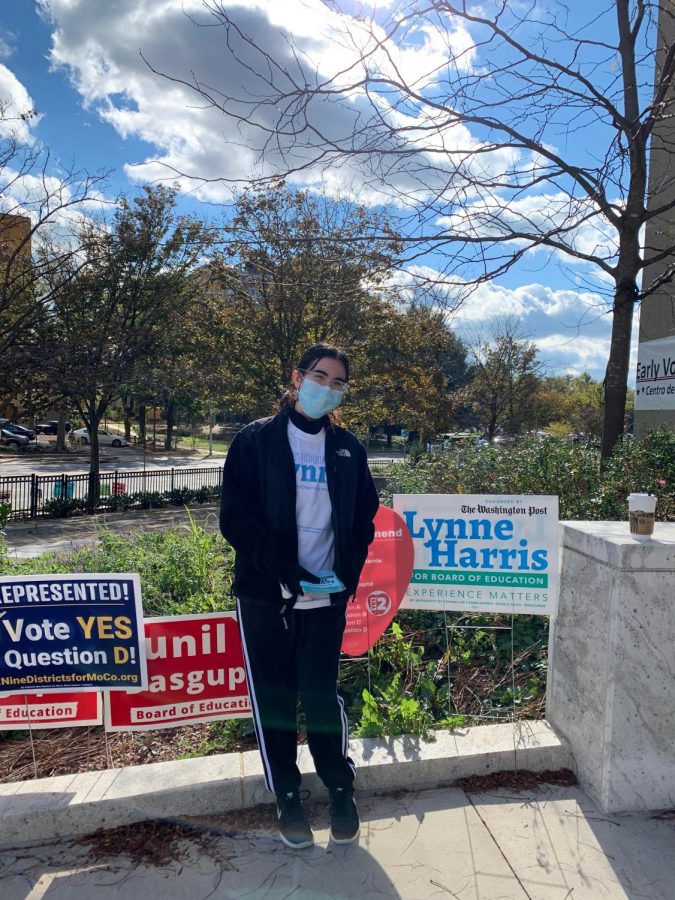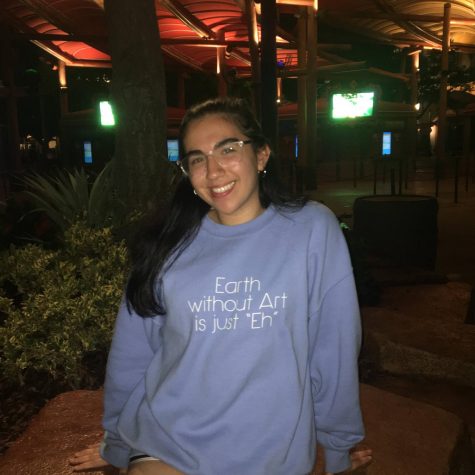How working on a political campaign changed my life
Victoria Koretsky stands outside of the Executive Office Building in Downtown Rockville during an early voting volunteer shift.
December 14, 2020
How did I get involved?
When I hear politics, I think of the bigshots in Washington D.C. and all the elected and appointed people that are constantly on the news. I do not immediately think of Montgomery County Councilmember Evan Glass, Maryland state senator Cheryl Kagan, or even Larry Hogan, the state governor. For me, and I think for most people, local politics has never been in the forefront of my mind. For students especially, the candidates do not make much effort to involve the youth. However, this year, I volunteered on Lynne Harris’s Montgomery County Board of Education (BOE) campaign, and it completely changed my perspective on local government and volunteering in general.
I first met Ms. Harris in 2018 on the Montgomery County Commission on Children and Youth (CCY). The CCY is the only county commission out of around 80 that includes youth members, yet few students know about it or bother to apply. From 2018-2020, I was a youth commissioner on the CCY, working to gather, represent and advocate for student perspectives that often go unheard. I worked closely with Ms. Harris, who at the time was a parent representative, to advocate for the Kids Ride Free 24/7 program, the Vision Zero pedestrian safety plan and various other mental health, school safety and school diversity plans. When I spoke of Ms. Harris, who led and mentored the youth commissioners, to my mother, she promised me that Ms. Harris would one day run for office and encouraged me to volunteer when the time came.
In late 2019, Jeanette Dixon announced that she would not run for re-election for the at-large BOE seat, and in mid-2020, Ms. Harris won the primary for the seat. When I emailed to congratulate her, I offered my help. About a month later, Zoe Tishaev, the 2019 runner-up for county SMOB and, as I then found out, Ms. Harris’s campaign manager, followed up to interview me.
Unaware of the vast student base that Ms. Harris’s campaign would garner, I believed that I would just be mentioning Ms. Harris to some family friends and doing some social media promotion. However, after interviewing me, Zoe offered me a volunteer position as a campaign deputy. I accepted, both needing more internship hours and having quite a bit of free time during a summer in lockdown. Within the next few hours, I was deemed the Greater Rockville deputy and field organizer, and I (virtually) met four other student deputies from around the county.
What did the job require?
In the beginning, I was in charge of reaching out to students through social media, hosting campaign orientations and explaining their volunteer jobs. The campaign had not yet started phone banking and we were largely unable to meet up, so the summer, both for student volunteers and myself, was fairly quiet.
As school started, though, the campaign began to ramp up in intensity. We began phone banking in the first week of October, and it soon escalated to two or three phone banking sessions each week. We had a few in-person, socially-distant meetings, but most of our communication was limited to being online. I was always on the lookout for questions from volunteers, and I created weekly updates so people could better understand the inner workings of the campaign. I also had to pick up literature and t-shirts for the campaign and distribute them to students all around the cluster, which is surprisingly hard to arrange for a group of busy high schoolers.
At this point, I was spending a few hours each week on the campaign. With a virtual campaign, these jobs had flexible timings, so it was much easier to manage along with school and extracurriculars. I doubt that I would have been able to handle this many commitments at once in a normal year.
However, late October to election day proved little better than impossible to handle. I volunteered at early voting polling locations for hours nearly every day that I did not have school. I was in charge of both recruiting new volunteers and pushing everyone to hand out literature at early voting centers. Surprisingly (or not), volunteering in the chilly weather with other students you did not know was not an enticing deal.
Coupled with the extracurriculars and school clubs that were beginning to meet again and the loads of homework (given our ‘plenty of time at home’), I am amazed I was able to complete it all. This is not to mention the pressures of the world situations: news of the national election, Supreme Court discussions and spiking coronavirus cases bombarded my already busy schedule every day. And still the school board election approached in earnest.
On the day of the election, I woke up at 6 in the morning and drove to RM, stationing myself in between the Democratic and Republican stands to promote the low-turnout BOE race. For six hours, I ran between RM and the Executive Office Building site in downtown Rockville to check on volunteers and hand out campaign materials in both locations. I spent the rest of that day anxiously waiting for results to come out. I physically felt sick, both from the lack of sleep and sheer pressure of the last two weeks. As the polls closed, Ms. Harris was way ahead of her opponent, Sunil Dasgupta, and the race was called for Ms. Harris later that day.
Was it worth it?
The job was not without its drawbacks. It was extremely hard to balance during the school year. Despite being mostly virtual and adjustable depending on my schedule, the last few weeks were really difficult to handle. Moreover, in volunteer work, participants will often fail to show up or communicate after first signing up. Leaders are responsible for reaching out and pushing people to participate. As a student who knows how overwhelming all these different commitments can get, I hesitated to be strict and hold people accountable. However, my hesitation left far too many opportunities for students to back out without communicating.
Overall, though, I think this was an amazing experience, and I am very thankful for the opportunity. I was introduced to not only local government, but a life in politics. Despite having taken magnet government, I had no idea how intricate even a local BOE election could actually get, and just how many people were involved in the process. I was able to hone my leadership, organization and time management skills. I also had the privilege of meeting dedicated students around the county. I led many of them throughout the campaign, but I learned just as much, if not more, from them. These volunteers came from all different backgrounds, and yet they united under their passion to highlight the student voice.
I urge every student to get involved in local politics at some point. As long as you are aware of the time commitments in your role and prepared to manage your time, it is definitely worth it. Voting is such a big part of American political culture, and it is an important learning experience, no matter what your career interest is. You meet people with similar values, and you have the opportunity to reach out to them for future political endeavors. You learn more about students’ roles in government, and it gives a voice to students in a way that is often overlooked.



